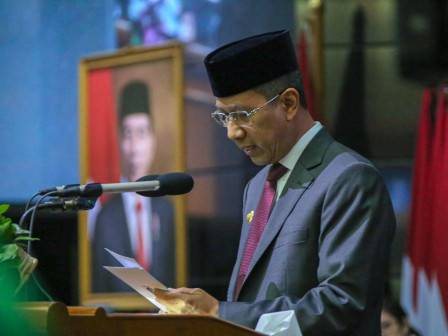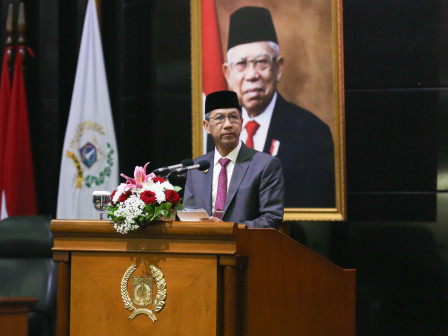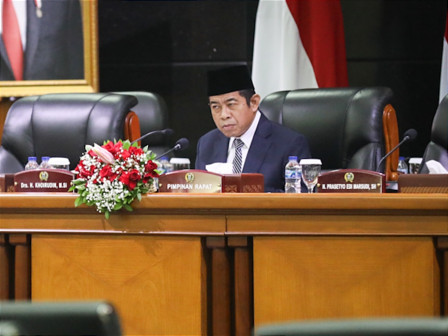Heru Appreciates Legislative for Realizing Budget Efficiency for Sustainable Development in Jakarta
Reported by Folmer | Translated by Rizky Mawardi
Jakarta Provincial Government and City Council both agreed Draft Amendment to the Regional Revenue and Expenditure Budget (RPAPBD) for the 2024 Fiscal Year.
make the discussion at the Regional Regulation Formation Body Meeting smoothly
The agreement was signed by signing MoU of Changes to General Budget Policy and Changes to Priorities and Temporary Budget for Fiscal Year 2024 during Plenary Meeting, at City Council Building Kebon Sirih, Central Jakarta, Wednesday (8/7).
Acting Jakarta Governor, Heru Budi Hartono, appreciates legislative for supporting executive in realizing budget efficiency for sustainable development of Jakarta.
City Council Approves APBD 2023 Accountability Draft"It is hoped that this momentum can make the discussion at the Regional Regulation Formation Body Meeting smoothly, so that the Council and Executive can work together to complete the Regional Regulation on Changes to the Regional Revenue and Expenditure Budget for the 2024 Fiscal Year according to the schedule that has been decided before," said Heru, as quoted from Jakarta Provincial Government's press release.
Heru explained that the total Draft Amendment to the Regional Revenue and Expenditure Budget for the 2024 Fiscal Year is Rp 85.47 trillion, or 4.60 percent bigger compared to the Determination of the Regional Revenue and Expenditure Budget for the 2024 Fiscal Year of Rp 81.71 trillion.
"Regional Revenue in the Revised Regional Revenue and Expenditure Budget for Fiscal Year 2024 is planned at Rp 75.22 trillion or 3.83 percent bigger compared to the Determination of the Regional Revenue and Expenditure Budget for Fiscal Year 2024 of Rp 72.44 trillion. Regional Revenue is expected to come from Original Regional Revenue by Rp 50.49 trillion, Transfer Revenue by Rp 24.02 trillion, and Other Legitimate Regional Revenue by Rp 702.84 billion," he explained.
Heru added that the Regional Original Revenue Plan is expected to be obtained from Regional Taxes amounting to Rp 44.98 trillion, Regional Retributions amounting to Rp 666.76 billion, Results of Management of Separated Regional Assets amounting to Rp 634.39 billion, and Other Legitimate Regional Original Income amounting to Rp 4.21 trillion. Meanwhile, Transfer Income is expected to be Rp 24.02 trillion which comes from Central Government Transfers, then for Other Legitimate Regional Income it is expected to be Rp 702.84 billion, which comes from Grant Income.
"Regional Expenditure in the Revised Regional Revenue and Expenditure Budget for Fiscal Year 2024 is planned at Rp 76.29 trillion or 5.09 percent bigger compared to the Determination of the Regional Revenue and Expenditure Budget for Fiscal Year 2024 by Rp 72.60 trillion. The Regional Expenditure Plan consists of Operational Expenditure, Capital Expenditure, Unexpected Expenditure, and Transfer Expenditure," Heru added.
Heru also described the Financing Receipts in the Revised Regional Revenue and Expenditure Budget for Fiscal Year 2024 which had been planned at Rp 10.25 trillion. This came from the previous year's Budget Calculation Surplus (SiLPA) of Rp 6.54 trillion and Regional Loan Receipts of Rp 3.71 trillion.
"Financing expenditure is planned at Rp 9.17 trillion, which is allocated to Regional Owned Enterprises in the form of Regional Capital Participation of Rp 7.31 trillion and Principal Installment Payments of Debt due at Rp 1.86 trillion," Heru stated.
As for information, in accordance with the mandate of the Regulation of the Minister of Home Affairs Number 15/2023 about Guidelines for the Preparation of the 2024 Fiscal Year Regional Budget and the Memorandum of Understanding between the Jakarta Provincial Government and the Jakarta Provincial City Council (DPRD) about Changes to the General Policy of the 2024 Fiscal Year Regional Budget and Changes to the Priorities and Temporary Budget of the 2024 Fiscal Year Regional Budget, changes to the 2024 Fiscal Year Regional Budget are intended for:
1. Encourage the implementation of development strategies and development policy directions
2. Fulfilling the obligation to provide education and health budgets in accordance with legislation
3. Spending budget for:
a. Development of quality infrastructure and basic urban services (flood control, traffic congestion management and waste management)
b. Increasing employment opportunities and workforce adaptability
c. Economic growth and business sectors based on experience and added value are realized in controlling the impact of the future economic recession.
d. Urban ecosystem restoration and implementation of low carbon development
e. Reducing inequality through meeting basic needs and ensuring social protection
f. Improving the quality of accessibility and ease of public services
g. Equal educational opportunities for all accompanied by lifelong learning education
h. Improving quality and life expectancy through urban health improvements
4. Promoting Jakarta's role as a global business city
5. Providing various assistance in the form of:
a. Public service subsidies
b. Grant
c. Social Assistance for certain social communities
d. Financial Assistance for other Regional Governments in the form of cooperation/commitment between Regional Governments
6. Allocate budget to sectors that directly affect the interests of the community.



